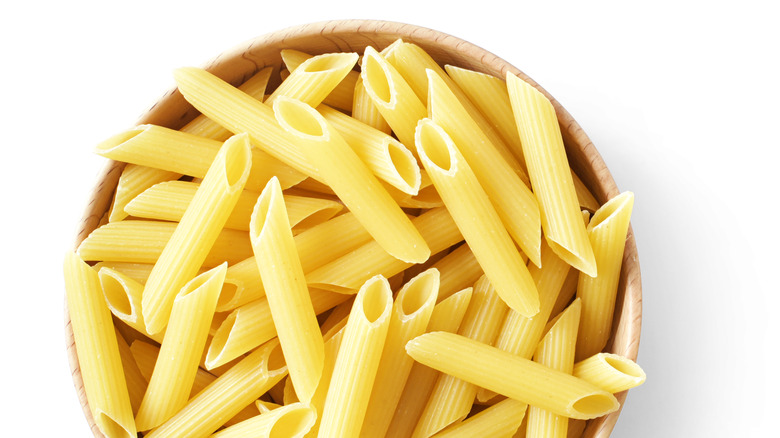Can You Store Dry Pasta In The Freezer?
There's something special about a warm bowl of pasta for dinner that can bring immense joy and comfort to anyone's day. It's incredibly simple to cook and requires minimal time and effort. Prepared countless ways, pasta is one of those dishes that you can dress up or dress down depending on the occasion. Many people opt for dry pasta because of its longer shelf life; store-bought fresh noodles can last up to three days, while the homemade stuff should be used within a day. Some dry pastas, meanwhile, can last as long as two years.
While typically a fairly affordable purchase, if you happen upon a great deal on dry noodles that you can't pass up on — or you've just run out of kitchen space — it can be challenging to figure out where to store them in your home, as well as how you're going to eat them before they hit their expiration date. If you need a way to keep your dry pasta long-term, your best friend just might be your freezer.
Why would you freeze dry pasta?
Dry pasta typically has a long shelf life, so it might seem strange to consider freezing it. But if you have a stockpile of half-empty boxes of orecchiette, or some linguini that you're worried you might not use within its two-year freshness window, freezing can be a smart idea. Beyond saving you a little space in your pantry, freezing dry pasta can inhibit the growth of bacteria, yeast, and mold, which can help to maintain its quality. So, if your penne is getting close to its expiration date, popping them in your freezer can potentially give you a bit more time to enjoy them.
Your goal in freezing your dry pasta is primarily to prevent it from becoming stale or absorbing moisture, which can cause it to clump together or spoil over time. That goal of keeping moisture out of your pasta also comes into play when we talk about how, specifically, you should store it in your home freezer.
How to store dry pasta in the freezer
If you plan on freezing your pasta, the most important thing to consider is the vessel you plan on freezing it in. If you haven't opened it, then you can probably just toss any bagged pasta in your freezer in its original packaging. If you've already opened the package, however, things are a little trickier.
You want to make sure you freeze your pasta in an air-tight container so it doesn't come into contact with any moisture from your freezer, which can cause your noodles to become gummy and stick together. A freezer bag or Tupperware container will get the job done. If you want to get slightly more serious, you can use a vacuum sealer to get rid of as much air as possible. Pasta noodles are fragile, so you'll also want to make sure that you're storing your noodles in a way so that they don't get crushed by other things in your freezer.
As long as you keep your noodles safe and dry, they will stay in your freezer indefinitely. The best part? When you're ready to cook them, they're good to go right out of the freezer with no need to defrost.


